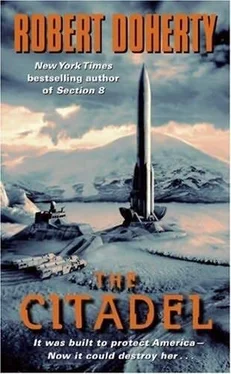"What kind of platform?" Bellamy asked.
"Unknown. That's all I've got."
"Roger."
Bellamy put the headset down. They'd received the news about the nuclear explosion several hours ago, and Bellamy hadn't been thrilled with the idea of jumping right in on top of that. As far as he knew, he was supposed to just secure the site, but the information he was getting over the radio was confusing. The biggest unanswered question was why had the bomb gone off?
Antarctic
Walking along with her head bowed, eyes following the trail, Tai almost tripped over the tread lying there. She looked up and saw the circle of debris from the tractor twenty meters ahead.
"What happened?" she asked. "Did they have an accident?"
"Looks like they threw a track," Vaughn answered. "They must have destroyed the tractor, and they're on foot now, pulling the bomb."
"We might catch them, then," Tai said, feeling a surge of adrenaline.
"Yes." Vaughn didn't even bother to look at the others. He walked past the wreckage and found the furrow on the other side formed by the sled the bomb was on. He set out at an even quicker pace.
8th Army Headquarters, Seoul, South Korea
The staff was assembled for the daily 1000 briefing. The mood in the war room was deadly serious as the speaker approached the podium. General Patterson sat in the first row, facing the front. The G-2 was the lead briefer, as always, and today he had a rapt audience.
"Sir, unless there is a drastic change in data trends, we are currently less than two hours from going to level three threat. Our intelligence indicates the entire Korean People's Army is mobilizing. There are also unconfirmed reports that first and second stage reserves are being given their mobilization orders. The South Korean 4th Infantry Division has destroyed one infiltration tunnel in their sector of the DMZ north of Kumsong when the exit was opened." The G-2's pointer slapped the map. "No report on ROK or PKA losses."
Patterson ran a hand through his thinning gray hair. Since taking command of the 8th Army a year ago, he'd known he was in the most volatile military theater in the world that wasn't yet hot. The two countries were still technically at war, over fifty years after most people thought the Korean War had ended. In those fifty-odd years, thousands of people-Korean and American-had died in what the politicians liked to term "incidents." But what was brewing now was no incident.
The accord that the two countries had signed in '92, promising better relations, had barely been worth the paper it was printed on. As long as Kim Il Sung ruled, there would be no united Korea other than under their rule.
"No indication of any drawback?" the G-3 asked.
"No, sir."
Patterson wasn't willing to wait two hours. Most of his combat troops were based less than an hour's flight time from the border, vulnerable to a quick air strike. While the carefully mapped intelligence plan for North Korean mobilization and preparation for war was accurate, Patterson also knew that there had been a very good intelligence plan in 1941 in Hawaii too. It hadn't worked too well.
Patterson had authority to go to level three. Two required presidential approval. He had been here long enough to know one thing. The North Koreans were determined to go through with this, especially if Kim Il Sung was dying.
"All U.S. forces will go to level three. I will inform my South Korean counterpart and the Pentagon."
Ford Mountain Range, Antarctica
"Hold on!" Min yelled as he felt the rope give way through his gloves. Lieutenant Kim and Corporal Lee-at the tail end of the sled-wedged their bodies behind it to keep it from sliding back down the hundred-foot incline they had just laboriously negotiated.
"Pull," Min exhorted Sun and Ho, and they tried to get a better grip on the icy rope in the front. Ho slipped, and that did it-the rope burned out of Min's grip, its entire weight bearing down on the two men on the rear. Lee screamed as the eight hundred pounds of weight snapped the leg he'd wedged up against the lip of the sled. Kim threw himself out of the way, and the sled ran over Lee's twisted leg and rocketed to the bottom of the incline before finally turning over.
Min slid his way down the hill to Lee. He didn't need to probe for the injury in Lee's thigh-white bone had pierced through the many layers of clothes and was exposed to the brutal cold.
Kim joined him, and they looked at each other over the injury. Lee's face was twisted as he forced himself not to scream again.
"We can pull him on the sled," Kim weakly suggested.
Min was angry at his executive officer for even saying that. With five men they had barely been able to keep pulling the sled. Now they were down to four.
Min slowly stood and took a deep breath.
"I will take care of it, sir," Kim said, obviously realizing the foolishness of his earlier comment.
"No." Min put his mittened hand on Kim's shoulder. "I am the leader. It is my responsibility." He looked down. "Do you wish for some time?"
Lee shook his head and closed his eyes. Min pulled his AK-47 up from where it hung across his back and slipped his index finger into the trigger finger in his mitten. He fired twice, both in the head, then turned and walked away. Behind him, Kim pulled two thermite grenades off his harness. He grabbed Lee's weapon, then placed one grenade on top of where Lee's face had been prior to the shots and one on his chest. He pulled both pins and followed his commander.
They went to the bottom of the hill. The puff and glow from the thermite grenades flickered on the incline above them as they struggled to right the sled. The fire had long burned out by the time they accomplished that and started the sled back up the hill, using longer traverses this time to prevent a repeat of the accident.
South Pacific Ocean
The flight deck of the Kitty Hawk was packed with rows of aircraft. F-14 Tomcats, E-2 Hawkeyes, S-3A Vikings, and F-18 Hornets competed for valuable parking space. On the port side of that crowded deck, the elevator from the first level hangar lifted into place smoothly, bringing up the only aircraft the carrier had just one of.
The most unusual thing immediately noticeable about the aircraft as it reached deck level was that the two engines at the end of each wing were pointing straight up, with massive propellers horizontal to the gray steel deck. The aircraft remained on the elevator as it came to a halt. Slowly, the two blades began turning in opposite directions.
After a minute of run-up, the aircraft shuddered and the wheels separated from the deck. Sliding slightly left, the aircraft gained altitude as the swiftly moving ship passed beneath. At sufficient height, the propellers slowly began switching orientation, moving from horizontal to vertical as the entire engine rotated and the airframe switched from helicopter mode to airplane. When the engine nacelles on the wingtips locked in place facing forward, the CV-22 Osprey caught up with the Kitty Hawk and passed it, racing ahead for Antarctica, 1,900 miles away.
The tilt rotor operation of the Osprey made it the most valuable and unique transport aircraft ever built. Congressional budget cuts and interservice squabbling had killed the program back in 1990, but this particular aircraft was one of eight that had been produced by Bell-Boeing during the original prototype construction. The eight had been deployed to the various carrier groups, flown by Marine Corps pilots, to allow maximum flexibility of use. That innovative deployment idea for an original plane was now paying dividends.
Ford Mountain Range, Antarctica
Tai sensed something different and halted. She peered ahead, trying to figure out what it was that had alerted her when she realized that it was the lack of something, rather than the presence, that had caught her attention. She turned around and looked back-Burke and Logan were almost a hundred meters behind them and moving very slowly. She had no idea how long she and Vaughn had been pulling away from them. It had been the lack of the sound of their shuffling feet on the ice that she had finally missed in her single-minded efforts to keep up with Vaughn.
Читать дальше











